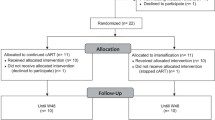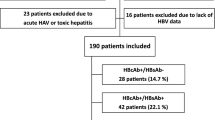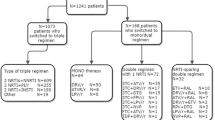Abstract
Twenty-eight patients with different stages of HIV infection who had not undergone antiretroviral pretreatment were treated with an escalating dose regimen of zidovudine (4 weeks 2 × 50 mg, 4 weeks 2×100 mg, 4 weeks 2×250 mg). CD4+ cell counts and p24 antigen levels were monitored every four weeks. Twenty-one patients were evaluable. p24 antigen levels showed a significant decrease after four weeks (p<0.01, Sign test, Wilcoxon matched pairs test) that was sustained until week 12 without a further significant decrease. CD4+ cell counts increased significantly within the first four weeks (p<0.01, Sign test, Wilcoxon matched pairs test). This increase was sustained until week 12 but no further significant increase was noted. Mean corpuscular erythrocyte volume values increased significantly after week 4 and continued to rise until week 12. These results demonstrate antiretroviral activity of a very low zidovudine dose, however low doses should not be used for treatment unless the clinical efficacy is shown to be equivalent to that of standard doses.
Similar content being viewed by others
References
Fischl MA, Richman DD, Grieco MH, Gottlieb MS, Volberding PA, Laskin OL, Leedom JM, Groopman JE, Mildvan D, Schooley RT, Jackson GG, Durack DT, King D, andthe AZT Collaborative Working Group The efficacy of azidothymidine (AZT) in the treatment of patients with AIDS and AIDS-related complex — a double-blind, placebo-controlled trial. New England Journal of Medicine 1987, 317: 185–191.
Volberding PA, Lagakos SW, Koch MA, Pettinelli C, Myers MW, Booth DK, Balfour HH, Reichman RC, Bartlett JA, Hirsch MS, Murphy RL, Hardy WD, Soeiro R, Fischl MA, Bartlett JG, Merigan TC, Hyslop NE, Richman DD, Valentine FT, Corey L, andthe AIDS Clinical Trials Group of the National Institute of Allergy and Infectious Diseases Zidovudine in asymptomatic human immunodeficiency virus infection. A controlled trial in persons with fewer than 500 CD4-positive cells per cubic millimeter. New England Journal of Medicine 1990, 322: 941–949.
Meng TC, Fischl MA, Boota AM, Spector SA, Bennett D, Bassiakos Y, Lai SH, Wright B, Richman DD Combination therapy with zidovudine and dideoxycytidine in patients with advanced human immunodeficiency virus infection. A phase I/II study. Annals of Internal Medicine 1992, 116: 13–20.
Land S, Terloar G, McPhee D, Birch C, Doherty R, Cooper D, Gust I Decreased in vitro susceptibility to zidovudine of HIV isolates obtained from patients with AIDS. Journal of Infectious Diseases 1990, 161: 326–329.
Larder BA, Darby G, Richman DD HIV with reduced sensitivity to zidovudine (AZT) isolated during prolonged therapy. Science 1989, 243: 1731–1734.
Author information
Authors and Affiliations
Rights and permissions
About this article
Cite this article
Stellbrink, H.J., Albrecht, H., Plettenberg, A. et al. Antiviral and immunological effects of escalating low doses of zidovudine in HIV-positive patients. Eur. J. Clin. Microbiol. Infect. Dis. 12, 618–621 (1993). https://doi.org/10.1007/BF01973641
Issue Date:
DOI: https://doi.org/10.1007/BF01973641




